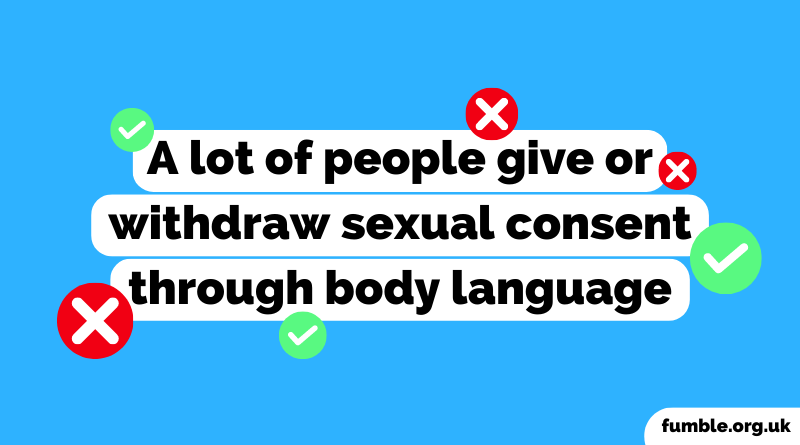Enthusiastic consent
When it comes to consent, it’s not enough to check for a ‘no’ – we need all the body language and words of a ‘yes’
There’s only one real rule when it comes to sex: you need consent. A big, strong ‘yes’, whether that’s with your partner’s words, body language or (even better!) both. It’s not enough to wait until a ‘no’. And that’s where enthusiastic consent comes in. Especially because it can be really difficult for a lot of people to say a direct ‘no’.
Jump straight to our Getting help section below if you want to access support around any experiences of sexual violence and unwanted sexual behaviour.
Getting sexual consent is the law, but more than that: it’s important to respect your sexual partner’s boundaries (whether they’re a long-term partner or a more casual hook-up). It’s also partly what makes for fun and pleasurable sex: consent, communication, respect and care.
Personal experience: body language can say ‘no’
It’s simple enough to agree that when someone says ‘no’, their partner needs to listen. But is this idea enough? What about all the other ways we express how we feel, either through more ‘gentle’ phrasing or with body language?

I’ve been in situations where my personal ‘no’ hasn’t always been acknowledged. I communicated this by: moving my face away from someone’s kiss, turning my body over, or removing their hands. These are all signs that I didn’t want to continue this sexual intimacy and I wasn’t consenting to sex. But this particular partner continued to try to initiate sex, multiple times over an hour. Eventually, I vocalised my lack of consent with an unambiguous, “look, I don’t want to sex with you”.
Having been in this situation, I don’t believe waiting for a direct ‘no’ is good enough. My then-partner should have understood my body language was communicating a lack of consent, and shouldn’t have continued what he was doing to the point I had to say what I said. He should’ve read that I didn’t want to continue, when I was moving away, and stopped.
The idea that someone is consenting unless they say a vocal and direct ‘no’ isn’t enough. There are many ways to communicate ‘no’, both vocally and with body language. So, let’s change our approach: if you don’t have a yes, there isn’t consent. This ‘yes’ can be understood as enthusiastic consent.
What is enthusiastic consent?
Enthusiastic consent is a phrase lots of sex educators and organisations have started to use in consent education. It means: someone is saying through their body language, words and expressions that they’re enjoying sex, they want it to continue, and they’re therefore consenting. It’s about saying yes freely and without feeling pressured. It’s about encouraging both people to pay attention to each other and respond to each other’s verbal and non-verbal expressions, making sure everyone is enjoying themselves.
Do I need to say ‘yes’ and what I’m thinking aloud?
Communication is an important part of sex. It’ll make sexual intimacy much more fun and comfortable if you feel able to talk to your sexual partner (whether long-term or not) about what you like and want, as well as what you don’t. If this feels tricky or awkward to imagine, you’re not alone! There’s still a lot of societal stigma and shame surrounding sex, and most of us aren’t taught how to talk openly about it. This is why a lot of people prefer to use slang and, sometimes not use words at all, instead relying on body language.
So, it’s really important to pay attention to each other’s body language and understand each other’s signs. This will probably feel easier, the more you know a person. At the same time, this can feel tricky. What one person does with their body to indicate their thoughts may be very different to how you’d imagine or how you’d express the same thoughts.
So how do I know if my partner is enthusiastically consenting?
You’ll know by listening to them, and taking the time to read and notice their body language:
- Is your partner happy and relaxed? Are they engaging in the activity, responsive and reciprocating?
- Or are they showing stiff body language and avoiding eye contact?
If the answer is yes to (1), those are signs that your partner is enjoying what is happening.
But, if the answer to (1) is no, and the answer to (2) is yes, stop straight away and ask them if they’re okay. Most importantly, don’t force them to continue and assume they’ll say ‘no’. It can be as simple as checking in: “Are you okay? We can stop if you want? It’s important you’re enjoying yourself.“
More signs of enthusiastic and positive body language:
✅ Smiling
✅ Eye contact and looking at you
✅ Nodding
✅ Being responsive, pulling you to them, touching you back
✅ Kissing you back
✅ Moving their body closer to you
More signs that someone isn’t enjoying themselves and they want to pause/stop:
🛑 Freezing up, feeling stiff and tense
🛑 Not looking at you, turning their head away from you
🛑 Crying
🛑 Silence
🛑 Flinching and moving away from you
🛑 Shaking
🛑 Looking frightened, unhappy, sad, panicky, or frowning
🛑 Sleeping, being unconscious or passing out (most likely because of alcohol/drugs)
🛑 Looking confused or not making sense
To sum up…
Sexual consent can feel tricky once we recognise how hard it can be to say ‘no’, to read each other’s body language, and that we all communicate differently. But, ultimately, sexual consent is about checking in, and starting intimacy with genuine care for your sexual partner (regardless of how committed the relationship is). You should be trying your best to make the other person feel as comfortable as possible, and aiming to give them the best time you can (though, that doesn’t mean doing things you don’t want to do!). We can do this by:
👍 Giving them the opportunity to say ‘no’
👍 Taking the time to understand their body language
👍 Checking in to make sure they’re enjoying themselves: “how’s this?” or “does this feel okay?”
👍 Listening to them: there are lots of ways we communicate ‘no’ or ‘stop’ indirectly
The more thought that goes into communication, building trust and considering each other’s feelings, the better the sex will be, and the more fun you’ll have together.
Getting help
If you’ve experienced any unwanted sexual behaviour or any kind of sexual violence, there are places you can go for help and support. You don’t have to manage this alone. There are specially trained professionals, who want to help, and you can disclose as much or as little as you feel comfortable.
Other support
- Sex and the law
- How to communicate during sex
- Am I in a healthy relationship?
- Resources for victims and survivors of sexual assault
- Brook – How to give and get consent
Read more
Last Reviewed 30 May 2023
Image Credit: Prince Akachi via Unsplash







